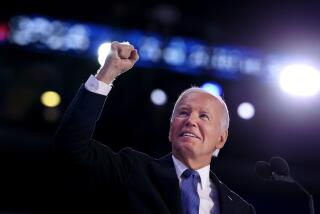Bush Declares His Path
- Share via
President Bush’s long-awaited speech Monday marked a decisive break with his administration’s on-again, off-again approach to the Israeli-Palestinian conflict. Never again can he pretend, as he did for months, that the United States can conduct a war on terrorism and at the same time remain aloof from the spiraling Israeli-Palestinian conflict.
While it was a relief to see the president acknowledging that only the U.S. could broker an agreement, he raised far more questions than he answered, particularly in calling for an all-new Palestinian leadership.
Bush sketched out a hopeful, even optimistic, vision of two states living “side by side” and poignantly referred to the unacceptable squalor of a daily Palestinian life that bred terrorism. In its stead, Bush invoked a Reaganite vision of capitalism and democracy that would allow Palestinians to shed their misery.
He called for monetary assistance from the World Bank and the International Monetary Fund to help reconstruct Palestinian society and said that Israel should release now-frozen funds to “responsible” Palestinian hands. He also stated that Israel should stop constructing settlements, which are a constant thorn to Palestinians. He rightly called for Egypt and Jordan to assist Palestinians in building a stable government.
But Bush placed the onus on the Palestinians to comply with Israeli demands for a complete cessation of terrorism before negotiations on bringing a Palestinian state into existence could begin. He set out a discouragingly long time frame, three years to statehood. In his boldest moment, Bush insisted that Palestinians rid themselves of “the Palestinian leadership,” which could hardly be interpreted as not including Yasser Arafat. This is an emotionally satisfying idea but ultimately an impotent demand.
No matter how contemptible Arafat may be, the U.S. needs to tread warily in declaring who is, and is not, a proper leader of other countries or peoples. What if the successor to Arafat is more militant? Would Bush refuse to deal with him or her as well? What criteria will the U.S. use to determine who is an acceptable representative of the Palestinians, especially since Arafat himself was democratically elected?
The president’s words might also be read as permission for Israel to expel Arafat, something that Prime Minister Ariel Sharon has been itching to do but which would inflame Palestinians.
As Palestinians continue to carry out indiscriminately deadly terrorist attacks and Israeli tanks rumble into the West Bank and Gaza Strip--in what Sharon calls, in part, a “massive operation” against Hamas--Bush correctly declared that the current situation was untenable. In coming months, it will take a sustained, patient and flexible operation by his administration to bring the two parties back from the edge of the abyss.
More to Read
Get the L.A. Times Politics newsletter
Deeply reported insights into legislation, politics and policy from Sacramento, Washington and beyond. In your inbox three times per week.
You may occasionally receive promotional content from the Los Angeles Times.










